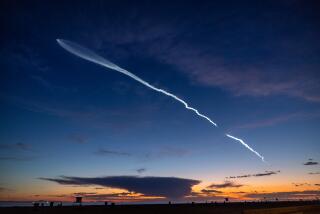Alaska Launch Site Awaits Commercial Takeoff
- Share via
POKER FLAT, Alaska — This rocket-launching site on the permafrost doesn’t have the fancy equipment or big payloads of the Kennedy Space Center or the U.S.S.R.’s cosmodrome at Tyuratam.
But given its proximity to the North Pole, its high success rate for suborbital, scientific launches and a unique lack of military red tape, the university-owned Poker Flat may be months away from a contract in the commercial satellite market.
“It’s as though the universe has contrived to put us in the right place at the right time,” said Glenn Olds, commissioner of the state Department of Commerce and Economic Development.
“We should be closing a deal on the funding and so on in the next few months,” he said. “We brought one of the big financial people and several others from a commercial satellite company up here. . . . Their minds were boggled.
“I would expect we’d launch in ’93.”
Poker Flat gets its name from a nearby creek and a Bret Harte short story about a group of outcasts abandoned in a blizzard.
Its remoteness in Alaska’s interior, about 35 miles northeast of Fairbanks, has left it largely unknown outside the scientific and space communities.
But 11 companies have made inquiries in recent months about commercial satellite launches into polar orbits.
Construction began on the rocket range in 1968 because scientists at the University of Alaska’s Geophysical Institute wanted to fire small rockets with instruments to study the aurora borealis, or northern lights, at an altitude of between 70 and 150 miles.
“A rocket is the only way to get inside the aurora,” said Neal Brown, an institute scientist who ran the range for more than a decade. “Planes don’t go that high and satellites to come down that far would fall out of orbit.”
The Geophysical Institute uses unguided one- or two-stage boosters that carry scientific payloads just high enough to reach the aurora’s field of highly charged particles, then fall back to the generally unpopulated tundra.
Range personnel recover payloads by helicopter and pick up other rocket parts when they can find them, said Jack Dillard, range manager.
Poker Flat had 234 launches through Feb. 12, with a success rate of more than 90%.
That record interests companies producing small-payload satellites, especially so-called micro-satellites, weighing 300 pounds or less.
More to Read
Sign up for Essential California
The most important California stories and recommendations in your inbox every morning.
You may occasionally receive promotional content from the Los Angeles Times.













